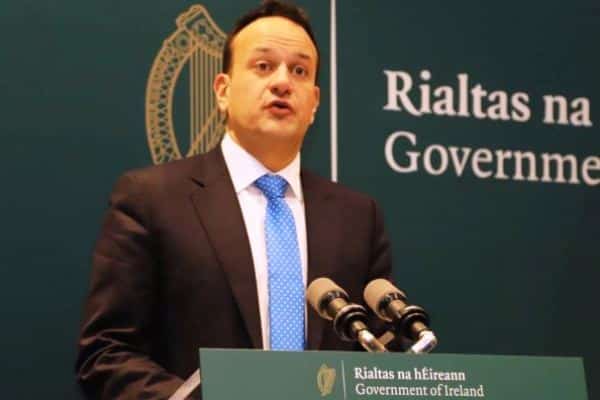The Government has announced even further measures in the ongoing struggle to prevent the spread of Covid-19. Taoiseach Leo Varadkar announced the government’s new restrictions to counter the spread of coronavirus today.
New guidelines on movement, which will run until April 19th, include a ban on gatherings of more than four people, all non-essential travel, with the government advising citizens to only leave home for essential work, going to the supermarket or medical facilities.
Mr Varadkar started by saying that the there are three types of measures on the way: a new expert group to be established, new financial support measures, and new emergency legislation to be enacted by the end of the week.
He has advised that people to stay at home, if at all possible, and said they can only leave home to go to work, go to shops for essential supplies or exercise, while visits to other people’s homes should be avoided and social gatherings of more than four people should be avoided also.
“Stay at home if at all possible,” The Taoiseach said. “Individuals should work from home if possible and all non-essential indoor visits to other people’s homes should be avoided.
“We cannot stop the virus but we can push it back, all of our resources are being deployed in the national effort.”
Mr Varadkar said: “We need to do more. I’m asking you to stay at home if at all possible to buy us time”. “You should only leave home to go to work if necessary, and to get supplies. Non essential visits to other’s homes are to be avoided.”
The measures will formalise already disrupted restaurants, cafés, hairdressers, theatres amid the wider service sectors regarded as non-essential, with the government now formally advising they should now close.
All non-essential retail outlets are to close, while others to limit capacity for social distancing. All theatres, clubs, hairdressers are to shut, while hotels are to restrict occupancy as much as possible.
Cafés and restaurants should now restrict to a take away only service. The Taoiseach also said construction sites and factories do not have to shut but to emply physical distancing.
No travel within or outside Ireland will be permitted unless absolutely necessary, while all planned cruise ship travel will cease. All sporting events, both indoor and outdoor, and behind closed doors will now end.
An increased presence of park rangers and gardaí in public spaces will increase to ensure implementation of social distancing. “Let’s play out part to ensure they’re not needed at all,” the Taoiseach added.
As expected, an increase in the weekly emergency Covid-19 welfare payment was announced. It will go up from €203 to €350 a week. Employees and the self-employed who have lost all their work because of the coronavirus can get that payment.
It has also approved a scheme for the government to pay up to 70% of a workers’ salary – as long as the employer pays the other 30%. That will be capped at €410 a week, or a €38,000 salary a year, from the Government and is designed to keep as many people in employment as possible while the crisis continues.
“The cost of all of this will be great, but we can bear it and we will be able to pay it back and we do so willingly because it is the right thing to do,” the Taoiseach said. “The self employed will also be covered, I know how worried they are at the moment, the government will do everything we can to sustain you.”
A framework agreement with private hospitals has been agreed, meaning they will operate as public hospitals for the duration of the emergency, which they have agreed to do on a not-for-profit basis, after consultation with the government.
The Taoiseach said: “This is not a lockdown.” Educational institutions, including schools and creches were closed almost two weeks ago after Mr Varadkar was advised by top medical officers that it would be essential in limiting the spread of coronavirus.
- All theatres, clubs, gyms/leisure centres, hairdressers, betting shops, marts, markets, casinos, bingo halls, libraries and other similar outlets are to shut;
- All hotels to limit occupancy to essential non-social and non-tourist reasons;
- All non-essential retail outlets are to close to members of the public and all other retail outlets are to implement physical distancing; [a list of essential stores is provided]
- All cafes and restaurants are to limit supply to take away food or delivery;
- All sporting events are cancelled, including those behind closed doors;
- All playgrounds and holiday/caravan parks will close;
- All places of worship are to restrict numbers entering at any one time to ensure adequate physical distancing;
- All organised social indoor and outdoor events of any size are not to take place.
It has also emerged that schools across Ireland will not reopen after Friday. Education Minister Joe McHugh says that although schools are closed up to March 29, they will not be opening immediately after that.
Joe McHugh has stated that the main focus of his department is having the state exams sit as normal in the June 3-23 period. Last week it was announced the 2020 Leaving Cert and Junior Cert oral and practical examinations had been cancelled, and all students who had been due to take the tests would be awarded full marks for that module.
The previous restrictions on pubs and universities will all be extended. Emergency legislation to impose a three-month rent freeze and a ban on evictions was approved by cabinet on Tuesday morning, and will be dealt with this week by the Dáil, when it sits on Thursday and is likely to be approved by the Seanad on Friday.








